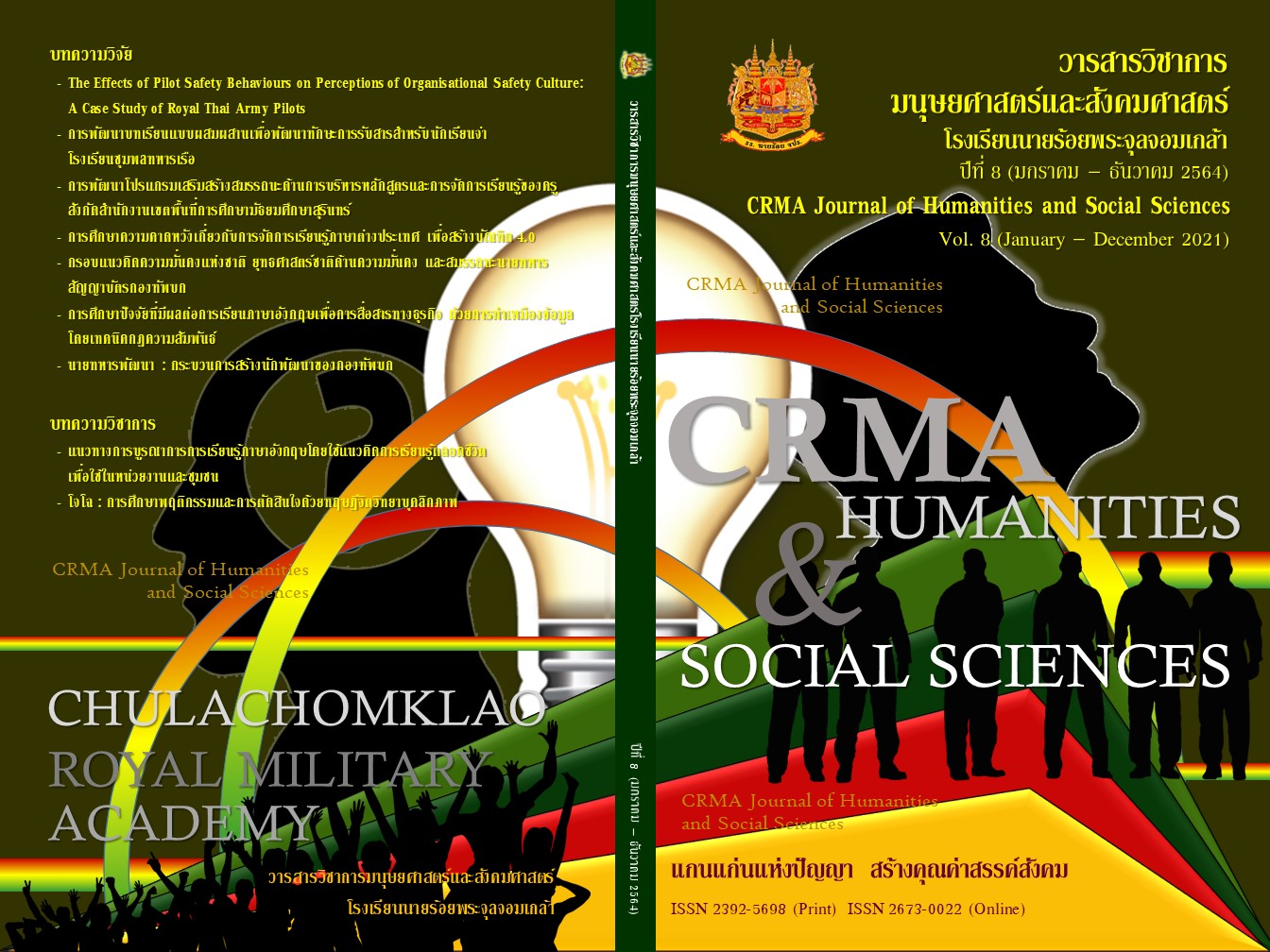DEVELOPMENT OFFICERS: THE PROCESS OF BECOMING AN ARMY DEVELOPMENT AGENT
Keywords:
Technology of Self, Self – Help Community, Foucauldian Narrative ApproachAbstract
This research aims to study the process of becoming development officers through the experiences of 3 military officers who are working for the Royal Thai Army’s Royal Projects. Participants were selected under the assumption that their developmental mindsets have been developed by the technology of self, based on Michel Foucault’s subjection concept, through their participation in social developmental practices to help build self-sustaining communities. The qualitative data was gathered through Foucauldian Narrative Approach by conducting semi-structured dialogue and in-depth interviews. The results revealed two types of identity development process. The first one strictly adhered to the developmental methodology guided by the “King’s Philosophy,” while the second type regarded the “King’s Philosophy” as the foundation that allowed Development Officers to construct their own approaches to building self-sustaining communities. The commonality between both groups was the specific nature of developmental work, which reflected the wider security mission of the Thai military.
References
ชนิดา ชิตบัณฑิตย์. (2554). โครงการอันเนื่องมาจากพระราชดำริ: การสถาปนาพระราชอำนาจนำในพระบาทสมเด็จพระเจ้าอยู่หัว (พิมพ์ครั้งที่ 2). กรุงเทพฯ: มูลนิธิโครงการตำราสังคมศาสตร์และมนุษยศาสตร์.
มิเชล ฟูโกต์. (2547). ร่างกายใต้บงการ. (ทองกร โภคธรรม, ผู้แปล). กรุงเทพฯ: โครงการจัดพิมพ์คบไฟ.
รัชนี ประดับ. (2556). ชุมชนเข้มแข็ง: ปฏิบัติการเชิงอำนาจของรัฐไทยสมัยใหม่. (วิทยานิพนธ์รัฐศาสตรมหาบัณฑิต). มหาวิทยาลัยธรรมศาสตร์, กรุงเทพฯ.
คณะกรรมการขับเคลื่อนสืบสานศาสตร์พระราชา สภาขับเคลื่อนการปฏิรูปประเทศ. (2560). การขับเคลื่อนสืบสานศาสตร์พระราชา. กรุงเทพฯ: สำนักงานเลขาธิการสภาผู้แทนราษฎร.
Boucher - Bonnafous, M. (2010). The Concept of Subjectivation: A Central Issue in Governmentality and Government of the Self. In Binkley, S., & Capetillo, J. (Ed.), A Foucault for the 21st Century Governmentality, Politics and Discipline in the New Millennium. Cambridge: Cambridge Scholars Publishing.
Charmaz, K. (2014). Constructing Grounded Theory: Introduction Qualitative Methods Series (2nd ed.). New York: SAGE Publications.
Cheshire, L. (2006). Governing Rural Development: Discourse and Practices of Self - Help in Australian Rural Policy. Cornwell: MPG Books Ltd.
Danaher, G., Schirato, T., & Webb, J. (2012). Understanding Foucault (2nd ed.). London: SAGE Publications.
Foucault, M. (1983). The Subject and Power. In Dreyfus, L., & Rabinow, P. (Ed.), Michel Foucault: Beyond Structuralism and Hermeneutics (2nd ed.). Chicago: The University of Chicago Press.
Foucault, M. (1988). Technologies of the Self. In The Aberdeen Body (Ed.), The Body: Critical Concepts in Sociology. London: Routledge.
Miller, P., & Rose, N. (1990). Governing Economic Life. Economy and Society. 19(1). 2.
Rabinow, P. (1984). Introduction. In Rabinow, P. (Ed.), The Foucault Reader. New York: Pantheon Books.
Riessman, C.K. (1993). Narrative Analysis. Newbury Park, CA: SAGE Publications.
Tamboukou, M. (2003). Women, Education and the Self: A Foucauldian Perspective. New York: Palgrave Macmillan.
Tamboukou, M. (2013). A Foucauldian Approach to Narratives. In Andrews, M., Squire, C., & Tamboukou, M. (Ed.), Doing Narrative Research. (2nd ed.) London: SAGE Publications.
Downloads
Published
How to Cite
Issue
Section
License
The content and information in this journal shall be considered as the individual opinions of the authors. In all cases, the editorial board may not necessarily agree with these opinions or be responsible for them.
The articles and information that are published in the journal are considered to be the copyright of the journal. Any party who wishes to re-publish the journal’s articles must seek permission from the journal’s editor. Articles that receive the agreement for publications must not appear in any other publications prior to their appearance in this journal. The editorial board will send one copy of the journal to each author whose submission was accepted and published.







